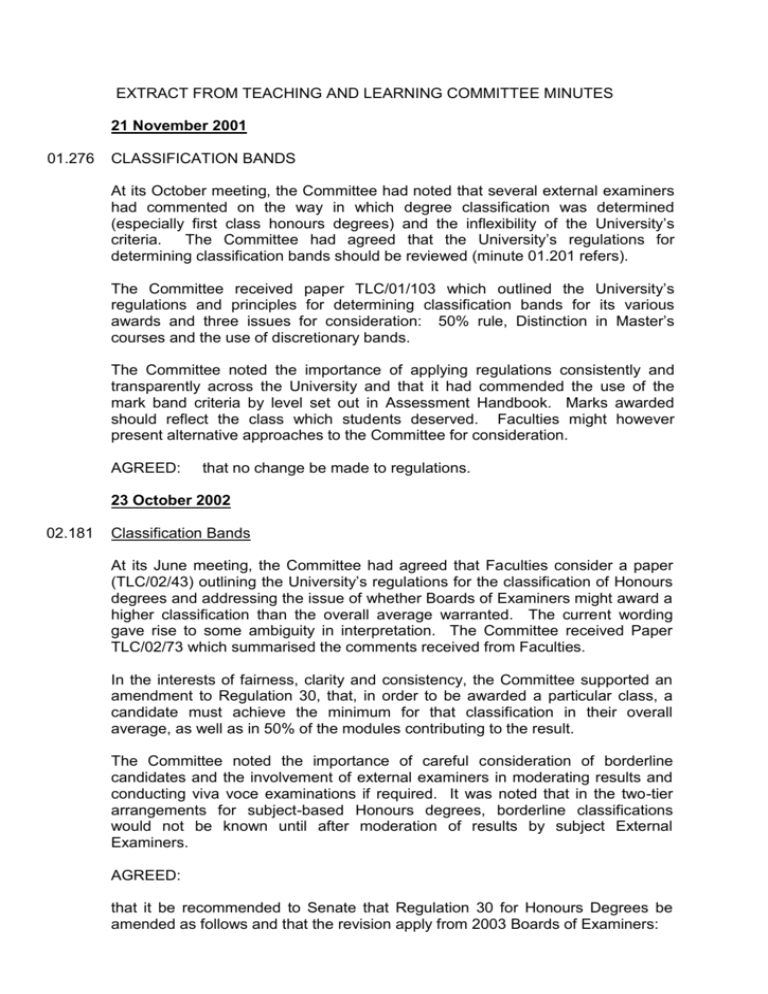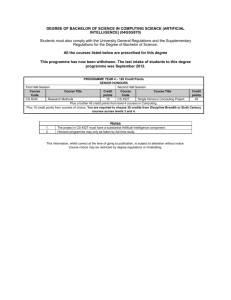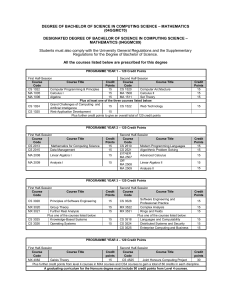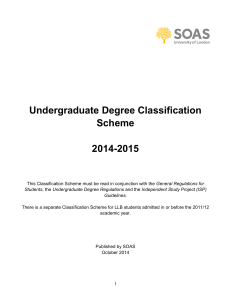Classification Bands - University of Ulster
advertisement

EXTRACT FROM TEACHING AND LEARNING COMMITTEE MINUTES 21 November 2001 01.276 CLASSIFICATION BANDS At its October meeting, the Committee had noted that several external examiners had commented on the way in which degree classification was determined (especially first class honours degrees) and the inflexibility of the University’s criteria. The Committee had agreed that the University’s regulations for determining classification bands should be reviewed (minute 01.201 refers). The Committee received paper TLC/01/103 which outlined the University’s regulations and principles for determining classification bands for its various awards and three issues for consideration: 50% rule, Distinction in Master’s courses and the use of discretionary bands. The Committee noted the importance of applying regulations consistently and transparently across the University and that it had commended the use of the mark band criteria by level set out in Assessment Handbook. Marks awarded should reflect the class which students deserved. Faculties might however present alternative approaches to the Committee for consideration. AGREED: that no change be made to regulations. 23 October 2002 02.181 Classification Bands At its June meeting, the Committee had agreed that Faculties consider a paper (TLC/02/43) outlining the University’s regulations for the classification of Honours degrees and addressing the issue of whether Boards of Examiners might award a higher classification than the overall average warranted. The current wording gave rise to some ambiguity in interpretation. The Committee received Paper TLC/02/73 which summarised the comments received from Faculties. In the interests of fairness, clarity and consistency, the Committee supported an amendment to Regulation 30, that, in order to be awarded a particular class, a candidate must achieve the minimum for that classification in their overall average, as well as in 50% of the modules contributing to the result. The Committee noted the importance of careful consideration of borderline candidates and the involvement of external examiners in moderating results and conducting viva voce examinations if required. It was noted that in the two-tier arrangements for subject-based Honours degrees, borderline classifications would not be known until after moderation of results by subject External Examiners. AGREED: that it be recommended to Senate that Regulation 30 for Honours Degrees be amended as follows and that the revision apply from 2003 Boards of Examiners: “The results of candidates who have successfully completed a course of study leading to the award of an Honours degree shall be graded by order of merit as first class, second class (upper or lower division), or third class. In order to be considered for a particular class of Honours degree a candidate must normally have obtained marks in the appropriate range or above in at least 50% of the modules contributing to the final award, in addition to achieving the overall minimum percentage. The following percentages shall be used as a basis for determining to determine candidates’ overall gradings in Honours degree courses: Class I Class II (division i) (IIi) Class II (division ii) (Iiii) Class III At least 70% At least 60% and less than 70% At least 50% and less than 60% At least 40% and less than 50%” 20 October 2004 04.151 Classification of Awards (Item 4) Four matters had been identified by a small number of external examiners. d) Basis of Classification An external examiner had raised the issue of whether the University’s classification system required students to clear too many thresholds, rather than basing the classification solely on the overall average mark. The Committee was of the view that the thresholds set by the University for classification were appropriate, given the need to ensure that students achieved the learning outcomes for the programme as a whole, and to demonstrate breadth in the appropriate class. 2







